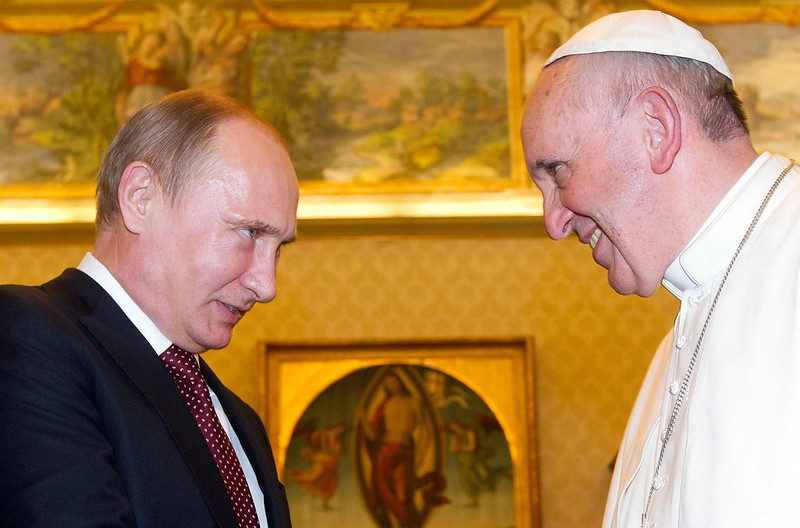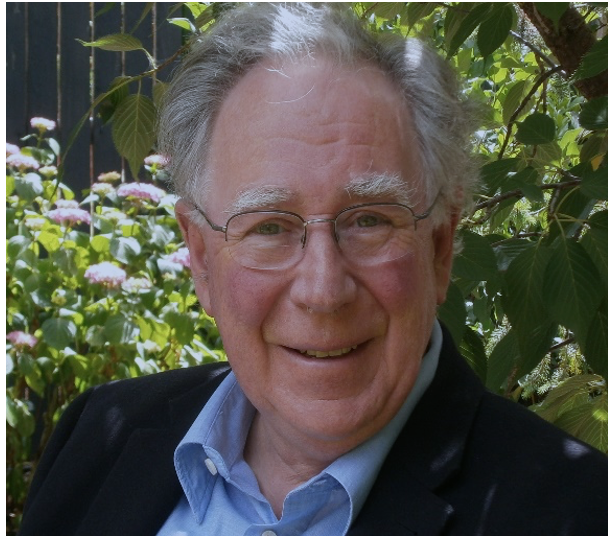Putin, the Pope and the Patriarch
March 15, 2022
While the invasion of Ukraine is fundamentally strategic, religion, faith and history also play a major part.
Until last Sunday Pope Francis response to the invasion of Ukraine was strictly diplomatic. The reason: the Vatican hoped to play a major role in bringing Putin to the negotiating table. Clearly the papal Secretary of State, Italian Cardinal Pietro Parolin, was calling the shots and Francis toed the line.
But on Sunday, things changed. Francis came out, metaphorically speaking, with all guns blazing. Directly addressing Putin, he said: In the name of God, I ask you: stop this massacre! He was referring specifically to the destruction of Mariupol, a city named for the Virgin Mary. He said the city is being martyred by the ruinous war that is devastating Ukraine. He condemned the barbarism of killing children and innocent people, and spoke of unacceptable armed aggression.
In the name of God, he said again, let the cries of those who suffer be heard and let the bombings and attacks cease! Let there be a real and decisive focus on negotiation, and let the humanitarian corridors be effective and safe. No equivocation here!
It may be that information is coming back to the Vatican from the two cardinals Francis sent to the front line: Polish Cardinal Konrad Krajewski in Lviv and Canadian Cardinal Michael Czerny, in Barabs, a small Hungarian border town. You can see the war on TV, Czerny says, but when you meet people who are fleeing and who have left everything behind, the impact is on the gut. Perhaps he and Krajewski have got the message back to Rome that the time for diplomacy has ended.
So, while hes not used the word Russia, Francis has spoken of armed aggression and no valid strategic reason for the invasion. Perhaps hes trying to distinguish between the Russian people and Putin. Whatever, this is the kind of prophetic speech that is needed from Christian leaders. Until Sunday neither Russia nor Putin had been named as aggressors in the hope, as Vatican specialist, Robert Mickens points out, that this might convince the Kremlin that the Vatican could be an honest broker in the crisis. However, as Mickens says, this is based on the Vaticans assumption that its an important player in international affairs.
Youd have thought that they would have learned from Pius XIIs failure to condemn the Nazis for the Holocaust. Pius hesitation to speak out against the slaughter of the Jewish people was rooted in his diplomatic background. As I said in my book_Absolute Power_: The cardinals elected the wrong man in March 1939. They felt the church needed a diplomat but in fact the church needed a prophet who was willing to risk everything to make a stand against the Hitler regime. Whatever else he was, Pius XII wasnt a prophet.
Pope Francis, thank God, has now adopted the prophetic role of church leadership. Putin, like Hitler, utterly despises diplomacy. He imagines himself as a kind of crusader maintaining the pure culture of Russian Christianity against a corrupt, secularized West. Whether or not Putin believes this is a moot point. At heart he is probably a complete cynic using religion for his own ends.
To get perspective here we also need to look at whats happening within Russian Orthodoxy. Until 2019 the 25 million Orthodox believers in Ukraine accepted Moscow as their patriarchate. But the Ukrainian government and elements in the Ukrainian church in a nationalist move petitioned the Patriarch of Constantinople (Istanbul), Bartholomew I, for autocephaly (independence) from Moscow, which was granted in January 2019. Ukrainian Orthodoxy split: 58% went to the autocephalous Church, 25% maintained the connection with the Patriarchate of Moscow.
The Moscow Patriarch, Kirill, unequivocally supports Putin. Two Sundays ago Kirill said: We have entered into a struggle thats not physical, but of metaphysical significance. He claims that Kiev is the historical heart of ancient Rus and is the source of its faith. Putins justification for invading Ukraine is to return the country to Orthodox unity under the Moscow patriarchate.
However, hes miscalculated. The Orthodox church in Ukraine, while still recognizing the Moscow Patriarchate, has remained patriotically loyal and is highly critical of the Russian churchs policy of supporting the invasion.
The Ukrainian Orthodox priest and theologian, Father Cyril Hovorun, says that Russian Orthodoxy needs to be de-Putanized. He says that notions like a Russian world and a so-called Orthodox society are fascistic and authoritarian heresies.
Recently in_La Croix_(10/3/22)www.international.la-croix.com/news/religion/orthodox-theology-must-be-de-putinized-says-leading-church-scholar/15772Hovorun argued that Orthodoxy fills the ideological vacuum left in Russia by the collapse of Communism. In the early-2000s it gave the state a goal and mission, both historical and metaphysical. Putin uses this as a form of civil religion which underpins the invasion with the quasi-religious idea that there is a Russian World, of which Ukraine is part.
Hovorun says that this isnt just a land grab by Putin, but the protection of a mythical history of Orthodox civilization in Ukraine. It is pitted against the corrupt West with its roots in the lies and heresies of Catholicism and Protestantism. Its as if Kievan Rus, Christianised in the tenth century was still a relevant geopolitical reality today [with] Kiev as the cradle of Russian Christianity.
Here Hovorun isnt saying Putin believes this pseudo-historical theology, but cynically uses it to justify his actions. He casts himself as Orthodoxys saviour and his invasion in terms of Christian Russia against the ontologically evil West which infects Russian and Orthodox civilization with its secularist heresies.
Even in Russia Putin and Kirill havent had it all their own way. A group of nearly 300 Russian Orthodox priests have called for an immediate ceasefire. Theyre not alone. Patriarch Bartholomew Iand an increasing number of Orthodox leaders worldwide have spoken out, perhaps best summed-upby Patriarch Theodore II of Alexandria when he said: You cannot say that you love God and kill people.

